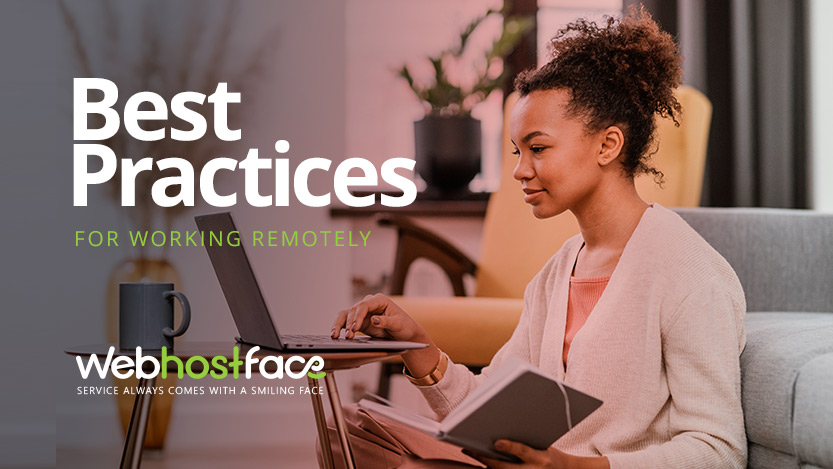There are many aspects of remote work that need particular focus. Not only can various elements affect the quality of your work, but you may even find things spiraling out of control and affecting your personal life.
Because of the potential impact of aligning your professional life so closely with home, you need to establish firm guidelines to operate within. How you manage things will vary depending on your circumstances, but here are some best practices you can work with to get started;
1. Establish a Clear Work Zone

Caption: A dedicated workspace helps draw a line between personal and business zones. (Image source: Unsplash)
Keeping a separate area for work in your home is always a good idea. Not only will you be less likely to misplace important documents, but it helps better define boundaries. Think of it as a clear indicator of the separation between work and play.
If space doesn’t permit you to set aside an entire room or area for the purpose, at the very least, have a boundary in mind. For example, clear a space on your dining table and set that aside for work alone. Sit at the same place daily so that it becomes a part of your routine.
2. Ensure Digital Safety is Given Proper Attention
One of the most significant issues when working remotely is in the area of cybersecurity. Regardless of how independent you are within an organization, a network connection instantly links you with the world at large.
Regardless of whether you’re a solopreneur or part of a massive group that needs to use corporate servers, the proper tools must come into play to ensure digital safety. Some of the tools you’ll need include;
Internet Security Application – We used to rely on antivirus applications to safeguard our devices. Thanks to the increased volume and scope of cyber threats, the focus has shifted towards more comprehensive cybersecurity solutions. Always ensure you sign up for a reputable security application to keep your device safe.
VPN – Virtual Private Networks (VPNs) can dramatically increase your digital privacy and security. By using a combination of encryption and secure servers, VPN services allow you to prevent data theft, block trackers, bypass bandwidth throttling, and more.
Firewall – Many desktop devices will include a software firewall, so many sure yours is enabled. For more uniform protection, look towards your router. Many modern routers have a firewall feature that you can turn on from the administration panel.
Password Manager – Complex passwords are vital to increasing the security of your online accounts and services. Yet, it can become challenging to manage the hundreds of them we may have. The answer to this question lies in the form of a password manager; it’ll handle everything for you.
3. Stay in Communication With Colleagues
Many remote workers and bosses stress about many strange things when people aren’t in plain sight. Keeping in contact with them can help alleviate this stress and ensure that work is on track and headed in the right direction.
Some bosses have asked remote staff to leave webcams on, but that’s extreme paranoia. Instead, use the right tools for specific purposes, and you’ll find pressure turn into work efficiency. Some of the communication and collaboration tools I use;
Slack – it’s a messaging platform, lets you make voice and video calls, plus share files. This versatility helps you keep in constant contact without being overly intrusive for regular workflow. Slack is available on multiple platforms, including desktop and mobile.
Asana – Where timeboxing is great for personal scheduling, you sometimes need something more collaborative. That’s where Asana comes in handy. You can assign work, discuss those assignments, attach documents, and more.
Google Apps – Google has a suite of Cloud-based productivity apps that are excellent for collaborative work. You can create documents and access them from anywhere. Entire teams can view, provide feedback, or even work on the same document. The best part is, these are free to use.
Zoom/Google Meet – If you need to give a presentation, Zoom or Google Meet is your best bet. These services allow features like screen sharing and interactivity so you can have dynamic sessions with everyone involved.
4. Keep Your Software Updated
Another loophole that lets hackers into home networks lies in the various apps you use. Your device often has multiple pieces of software from the Operating System (OS) to word processors and design programs.
Typically, software gets improved over time, and when this happens, developers release updates or patches. Along with those improvements come fixes for vulnerabilities discovered after they released the apps.
Not all apps will update automatically, so review the ones you use from time to time. Leaving apps unpatched is like using the same padlock for your front door – after you’ve already lost one key.
5. Schedule Your Time Effectively

Caption: Timeboxing is an old yet effective method to improve planning. (Image source: Bitcatcha)
Just as you can find yourself wandering in the office, so too can it happen at home. Thanks to creature comfort being within arm’s reach, you may become even more easily distracted. Think back to school days, and there’s a simple way to overcome this.
The answer to your scheduling problems is a timetable or, in business terms, “Timeboxing.” This method is tried and true, so don’t scoff at the effectiveness. There is a long list of Timeboxing benefits, including increased productivity and better planning.
Building a firm timetable for work isn’t just beneficial for business, but it also helps remind you of the importance of downtime. Knowing when you have a free ‘box’ or time outside the box can be beneficial for mental relaxation, destressing, or family moments.
Ideally, work out a timebox where you define regular hours for work each day. Keeping things regular is a good way of ensuring you don’t mess up your biological clock and stay on the same page as the rest of your colleagues.
6. Eat Healthily and Exercise
One of the core benefits of working from home is the omission of commute time and stress. However, this omission also means you’re missing out on the exercise gained from getting out of the house.
It can be very easy to lose yourself in your work, and from there, slide over to the couch and continue into personal time. Remember that you need to stay fit at all times to make sure you schedule some exercise to replace what’s lost from missing the commute.
Eat better means and hydrate properly; your body will thank you even if you feel it’s a pain to get moving.
7. Housework Can Serve as a Distraction
If you have problems moving away from the computer during your work hours, use housework as an excuse to take a break. Running the washing machine is an excellent natural timer; your break time is when the laundry goes in and an hour later when it comes out.
Taking a break to clean up your workspace can also be a form of exercise. It’s also a good habit to ensure that you don’t let clutter distract you at critical times.
8. Use Appropriate Music to Set the Mood
You’ve used music for entertainment or to get closer to your better at times. Playing the right tunes can also help increase your productivity. It’s difficult to tell you what music would work best, though, since that’s up to individual preferences.
Some work better with nerve stringing house tunes, while others like things mellow and jazzy. Experiment and see what works for you but remember to quickly switch themes if your selection becomes more distracting than helpful.
Some apps can help with various pre-set playlists. Use something like Spotify if you’re streaming music. For those with a massive music library in hand, Groove Music works for Windows users.
Final Thoughts
There are a million and one things you can do to improve your work from home experience. The most important thing, though, is to remember that no man (or woman) is an island. Stay in touch with the rest of the human race, even if it’s just to say “hi!” The focus shouldn’t only be on work but your well-being as a whole.




